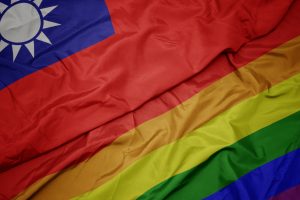Taiwan, Asia’s first nation to legalize same-sex marriage, is a trailblazer in its region. Despite the monumental victory of the 2019 same-sex marriage law, it was a compromise reflecting Taiwan’s struggle to push forward a divisive agenda. Today, there are more than 5,800 registered same-sex couples in the country, and public opinion has shifted decisively toward more support and tolerance for LGBTQ rights, with public acceptance of same-sex marriage growing to over 60 percent since 2018. However, equality for same-sex couples has not yet been reached and continued progress will depend on sustained public support and future electoral victories.
Since the Constitutional Court ruled that same-sex unions were a fundamental right in 2017, the path to equal marriage rights has been politicized and faced more obstacles created by opponents. In the 2018 midterm elections, a referendum was put forward by a coalition of conservative and traditional groups to prevent future amendments to the existing marriage code, the ideal way to guarantee equality. That referendum passed. Additionally, LGBTQ rights were collateral damage of President Tsai Ing-wen and her Democratic Progressive Party’s (DPP) major electoral defeat by the more conservative Kuomintang (KMT). Given the political cost, the passage of the 2019 same-sex marriage bill was a colossal achievement for Tsai — same-sex couples now enjoy many rights and benefits previously available only to heterosexual married couples.
Despite recent progress, same-sex couples still face legal barriers that deny them eligibility to adopt children and have access to artificial insemination, significantly impeding their familial rights. Nearly half of the Taiwanese public polled earlier this year, however, said they would support granting these protections to same-sex couples. While heterosexual marriages are recognized regardless of nationality, transnational same-sex marriages are restricted to only those involving a partner from the 28 countries that currently recognize same-sex marriage. The court’s recent decision to revise the law to legalize all international marriages — except for those involving a partner from China — is a welcome development.
Domestic politics remain divided on the issue. Tsai, who secured her legacy on equal marriage in her first term, will likely avoid revisiting the entrenched issue when she needs party support for more urgent policy objectives, such as COVID-19 recovery. Looking ahead, presidential candidates for the 2024 race will likely toe their respective party lines on the issue. DPP frontrunners, Vice President Lai Ching-te and Taoyuan City Mayor Cheng Wen-tsan, will most certainly continue the party’s historical support of the advancement of LGBTQ rights, even as political gains of further marriage reforms narrow and opposition voices within the party remain salient.
The KMT, which boycotted the same-sex marriage bill in 2019, holds a position that ranges from ambivalence to outright opposition to LGBTQ rights. Its continuous record of siding with conservative groups that reject marriage equality has sidelined young LGBTQ members within the party, exacerbating its struggle to draw in young members as it grapples with its new identity. As public opinion on the issue continues to shift, any attempt to reverse the marriage reform would surely burn immense political capital. Hou Yo-yi — mayor of New Taipei and a potential KMT presidential candidate — has been careful to use ambiguous language, voicing neither direct support nor opposition to marriage equality, or avoiding the issue entirely.
In a separate case, Taipei Mayor Ko Wen-je, potential candidate from the Taiwan People’s Party, stunned many gay rights activists by revealing his opposition to same-sex marriage during a visit to the United States. This is despite the fact that 82 percent of the members of his own party support LGBTQ rights, the highest of all political parties. The new party’s pragmatic, issue-specific position that frees itself from obliging to “get in line” with DPP or KMT agendas has garnered the attention of young voters.
In electoral politics, marriage equality was seldom a dominant issue that drove voters to support a political party or candidate, particularly in comparison to economics and cross-strait relations. However, the landscape is shifting. With over half of 18-39 years olds having close friends and relatives who belong to the LGBTQ community, LGBTQ rights are increasingly accepted as part of the modern Taiwanese identity.
Ideally, marriage equality should be a nonpartisan issue. This may be a tall order, but further progress on that front can surely be possible where public opinion, politics, and political will are all aligned.

































